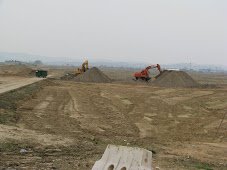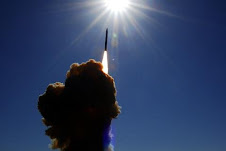* Text informed in StopNATO *
1) Star Wars! - US Military Calls for More Space Data;
Fri Apr 3, 2009 5:53 am (PDT)
Forward from mart
Please Distribute Widely
1) Star Wars! - US Military Calls for More Space Data;
2) Bonanza For Arms Makers! - Nearly Seven in Ten
Major US Arms Programmes over Budget!
==========================================
Army Technology.Com - "The website for the defence industries"
www.army-technology.com
April 2, 2009
1) US Military Calls for More Space Data
2) Nearly Seven in Ten Major US Arms
Programmes over Budget
------------------------
1) http://www.army-technology.com/news/news52542.html
US Military Calls for More Space Data
By Andrea Shalal-Esa, Reuters.
02 April 2009
US officials, poised to closely monitor North Korea's planned launch of a communications
satellite, this week underlined the need for improved data about what is going on in space.
Military officials said the United States needed to beef up its 'space situational awareness', or
ability to monitor satellites and debris floating around in space, but they gave few details on
any spending plans.
Boeing and other US defence contractors are anxiously awaiting the release of the Obama
administration's fiscal 2010 budget, probably in early May, to see how much funding it will include for space programmes.
"We must find better ways to learn what's in space," Navy Vice Admiral Carl Mauney, deputy
commander of US Strategic Command, told the Space Foundation's National Space Symposium.
He said improving the military's space surveillance capability was one of his top priorities,
and advocates an expansion of the country's current capabilities.
The effort would require more collaboration among government agencies, industry and
foreign countries, he said, as well as international guidelines for satellite operators.
US concerns about the safety of its satellites and the International Space Station escalated
after the February collision of a dead Russian communications satellite and a US commercial
communications satellite owned by Iridium, as well as China's useof a missile to destroy one
of its own defunct satellites in 2007, Mauney said.
He also mentioned the close pass of some space debris by the International Space Station last month and said ensuring the safety of human spaceflight was the command's top priority when tracking possible collisions in space.
The United States already operates surveillance satellites in space, and can use ground-based
equipment and other satellites to track missile launches.
Boeing surveillance satellite
But the growing number of satellites and countries that can launch them, including Iran, has heightened demand for better monitoring of the vast reaches of space.
The Pentagon's budget request last fall included an increase in funds for space programmes, mainly to address the increased surveillance needs, said a senior defence official, who was not authorised to speak on the record.
Top Pentagon officials have already briefed military commanders on the fiscal 2010 budget proposal and should turn over their plans to the White House soon, said the official.
Boeing is working on the space-based surveillance system (SBSS) satellite programme, and said it expects to launch the one satellite already ordered around mid-year.
A launch had been expected in March or April, but the date has slipped while Orbital Sciences
investigates the failed launch of its Taurus XL rocket in February.
Boeing said it is ready to build more satellites for the US military and says the satellite has '
tremendous capacity' to do even more than intended.
The air force initially had plans to order four SBSS satellites, but officials say they are still documenting the military requirements.
The cost of the first SBSS satellite, built by Boeing and its partner Ball Aerospace, including launch costs, ground systems and maintenance through 2011, is around $800m, according to air force officials.
Mauney said US Strategic Command would use its existing sensors to monitor the expected launch of a North Korean communications satellite between 4 and 8 April. Washington and its allies see the plan as a disguised missile test.
Subscribe to:
Post Comments (Atom)

![[URGENT PLEA: In Update] EMERGENCY in GANGJEONG Since AUG. 24, 2011](http://2.bp.blogspot.com/-3iz8k-USXVY/TlmRYhhIYtI/AAAAAAAAL2c/9dbF85ZIkIs/s227/jejusit.jpg)



![[Solidarity from Japan for the Jeju] 253 individuals and 16 groups/organizations](http://2.bp.blogspot.com/_gnM5QlRx-4c/TR_YeNVE1yI/AAAAAAAAHWQ/ARyf6oQN0S0/S227/jeju_12_10j.jpg)

![[Translation] Korean organizations' statement: Immediately cancel the joint ROK-US drill Nov 26](http://2.bp.blogspot.com/_gnM5QlRx-4c/TPOE8VKXHFI/AAAAAAAAGlM/8lryt-8sFjc/S227/1.jpg)
![HOT! [Hankyoreh Hani TV] Beneath the Surface: the investigation into the sinking of the Cheonan](http://4.bp.blogspot.com/_gnM5QlRx-4c/TOI83qht8aI/AAAAAAAAGXU/22SW6Q5ntV8/S227/HaniTV%2BCheonan.gif)



![[Translation]Statement against illegal inspection and unjust lay-off by the Kunsan USAFK!(Nov_2010)](http://4.bp.blogspot.com/_gnM5QlRx-4c/TOPLsVkZMqI/AAAAAAAAGZs/3YnnckIyAaY/S227/gunsan%2Bprotest.gif)
![[Translation] Korean organizations' statement against dispatching special force to the UAE on Nov.](http://4.bp.blogspot.com/_gnM5QlRx-4c/TOP95zHXlCI/AAAAAAAAGak/E0Ug1XtUFfM/S227/antiwarpeace.jpg)
![[Translation] Stop, Joining MD!: South Korean activists' statement and writing on Oct. 25, 2010](http://3.bp.blogspot.com/_gnM5QlRx-4c/TOP7Es4_2sI/AAAAAAAAGac/eWVMPD-U4p0/S227/StopMD.jpg)
![[In Update] People First, NO G-20 (Nov. 6 to 12, Korea)](http://2.bp.blogspot.com/_gnM5QlRx-4c/TJd53XBzHlI/AAAAAAAAFQo/ldO9JPE3eqo/S227/left21_G20.jpg)
![[International Petition] Stop US helipad plan in Okinawa to save great nature](http://4.bp.blogspot.com/_gnM5QlRx-4c/TKC2AHRNzBI/AAAAAAAAFUo/yGWXODTw_uM/S227/yanbaru_w.jpg)

![[Global Network] against the first launch of Quasi-Zenith Satellite, Japan, on Sept. 11, 2010](http://4.bp.blogspot.com/_gnM5QlRx-4c/TIowa1boy4I/AAAAAAAAFDI/82rAi98uq-c/S227/Qzss-45-0_09.jpg)

![[In update] Some collections on the Koreans’ protests against the sanction & war on Iran](http://4.bp.blogspot.com/_gnM5QlRx-4c/TJMvke6t8zI/AAAAAAAAFO4/tamQ8LUnOOA/S227/No+Sanction+on+Iran.jpg)
![[Three International Petitions] to End the Korean war and peace treaty(or peace resolution)](http://1.bp.blogspot.com/_gnM5QlRx-4c/THef7bzWxYI/AAAAAAAAE44/wwdzSDfYhdw/S227/border.jpg)



![[Collection of Documents] No Base Learning and Solidarity Program_Korea(June 14 to 20, 2010)](http://1.bp.blogspot.com/_gnM5QlRx-4c/TCTvVuN8NeI/AAAAAAAAEek/8vBJVaHdk10/S227/No-Base-banner.jpg)
![Site Fwd:[John Hines] A U.S. Debate coach’s research trip on the Issues of Korea](http://3.bp.blogspot.com/_gnM5QlRx-4c/TINCO36mzzI/AAAAAAAAE_w/Rds12NcBOXM/S227/Jeju-Peace-Tour.jpg)


![[News Update] Struggle Against the Jeju Naval Base since Jan. 18, 2010](http://1.bp.blogspot.com/_gnM5QlRx-4c/S1vvWaP25uI/AAAAAAAACkg/QvpW1tgOlKM/S226/scrum1.jpg)


![[Urgent] Please spread the Letter!: There was no Explosion! There was no Torpedo! (May 26, 2010)](http://4.bp.blogspot.com/_gnM5QlRx-4c/S_9JmsKEU7I/AAAAAAAAEP8/sAWjSPqxzUI/S227/grounded.jpg)
![Text Fwd: [Stephen Gowans]The sinking of the Cheonan: Another Gulf of Tonkin incident](http://1.bp.blogspot.com/_gnM5QlRx-4c/TAL_FtYKQ-I/AAAAAAAAERE/NEEMijiEcRM/S227/lee-myung-bak.jpg)
![[Japan Focus]Politics in Command: The "International" Investigation into the Sinking of the Cheonan](http://1.bp.blogspot.com/_gnM5QlRx-4c/TBMJ2syJzyI/AAAAAAAAEZU/uTYZccU5vyk/S227/wen_jiabao_and_lee_myungbak.png)
![[Japan Focus] Who Sank the SK Warship Cheonan? A New Stage in the US-Korean War and US-China](http://2.bp.blogspot.com/_gnM5QlRx-4c/S_iQ2vE5ZpI/AAAAAAAAEOU/Oo1SPcAe8FE/S227/buoy_map.gif)
![[Updated on 12/13/10] [Translation Project] Overseas Proofs on the Damages by the Military Bases](http://4.bp.blogspot.com/_gnM5QlRx-4c/S-qSj59gPLI/AAAAAAAAEGM/mwjlFtPE-jo/S227/missile.jpg)
![[International Petition] Close the Bases in Okinawa](http://3.bp.blogspot.com/_gnM5QlRx-4c/S8-z3DYNwNI/AAAAAAAADo4/OswTSchK09M/S227/2.jpg)

![[In Update]Blog Collection: No Korean Troops in Afghanistan](http://4.bp.blogspot.com/_gnM5QlRx-4c/SwnlLD9IewI/AAAAAAAAB9E/oUPssnpNidA/S226/No-Troops-to--Afghanistan.jpg)











No comments:
Post a Comment